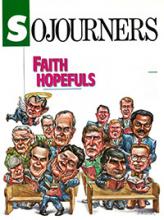It offered great promise, was something of a milestone, yet ended in bitter disappointment, apologies, and some confusion. South Korea's December 1987 presidential election of Roh Tae Woo was the first since Gen. Park Chung Hee defeated Kim Dae Jung in 1971, a vote widely believed to have been stolen. More important, December's balloting was significant because it was brought on by the determination and the years of work and sacrifice by laborers, students, dissidents, women, and religious people in South Korea.
Their work for democracy culminated in the June 1987 demonstrations that forced the military regime of Gen. Chun Doo Hwan to give in to popular demands for a direct presidential election. It was a shocking concession from a regime that came to power seven years ago in a military coup while bloodily suppressing protests in Kwangju, the capital of the southern province of Cholla.
But the elections were deeply disappointing as well. Despite forewarnings, the vote was tainted by widespread fraud, improprieties, and irregularities far more extensive than the U.S. media reported. Charges abounded before and just after the election of illegal practices, including harassment, switching of ballot boxes, multiple voting, substitute voting, and the abuse of absentee ballots, through which some 600,000 military personnel cast their votes.
Read the Full Article

